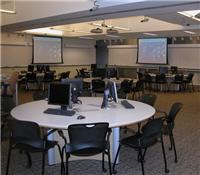Generating Designs
 The purpose of this activity is to practice designing UIs by sketching. Your goal is to design an interface for controlling the LCD projectors in a classroom like this one. Here's some relevant information from analysis.
The purpose of this activity is to practice designing UIs by sketching. Your goal is to design an interface for controlling the LCD projectors in a classroom like this one. Here's some relevant information from analysis.
Hardware
The room you're designing for has:
- Two video signal channels sent to a system of LCD projectors arranged in pairs, capable of projecting two different images side-by-side against each wall of the room, so that all students can see the projected images;
- One cable for a laptop;
- One desktop PC permanently installed in the room;
- Ten numbered whiteboards around the walls, each with its own camera focused on it.
Users
Lecturers are generally faculty members, aged 30-70. All have laptops. Some prepare lectures using PowerPoint; others prefer handwritten notes that they transcribe to blackboards or whiteboards. They don't have time to take a training class about A/V equipment.
Tasks
- Give lecture, which includes as subtasks:
- Show slides.
- Write on board, which may include as a subtask:
- Hide slides to avoid distraction.
- Show other material such as videos, web sites, or demos.
- Do small-group activity. Activities happen at the whiteboards around the room. This task includes as subtasks:
- Explain the activity, which may involve showing a slide, writing on the board, or showing a web page.
- Discuss a group's results by showing its whiteboard so that the whole class can see it easily.
Design Sketches
Design the interface that controls the two video signals going to the LCD projectors. (Assume that your interface will run on the built-in PC, so you have a keyboard, mouse, and high-resolution display.) Sketch at least three different designs. To help broaden your thinking, consider alternatives like this:
- a direct manipulation design
- a menu-and-forms design, using standard widgets
- a wizard
...but you aren't limited to these.
Discussion
After drawing your sketches, discuss their pros and cons. Think about:
- How simple are your designs? Can you reduce them further, or force elements to do double-duty?
- How well do your designs support the tasks?
- Which aspects of usability matter for these users and these tasks? How do your designs fare on those aspects?
- What if MIT decided to staff the classroom with a full-time A/V operator?
- How flexible are your designs for unexpected or new tasks?


